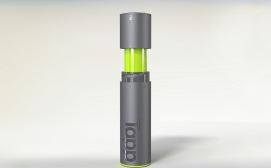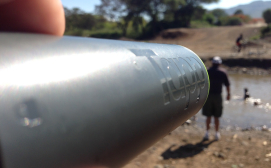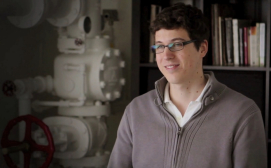Project Lead(s): Bradley Pierik
Issue
Diarrhea remains a leading cause of mortality among children under five years of age around the world; inadequate water and sanitation lead to high rates of waterborne illnesses.
Point-of-use water quality interventions could cut diarrhea episodes by half, with some studies suggesting disease reduction could be as high as 70% or more.
Solution
The objective of the project was to develop a handheld water filtration device for families in developing countries.
The filter – Tapp – not only removes bacteria, parasites and dirt to make the water potable, but is self-cleaning.
The project aimed to prove that the product would work through its expected lifetime and that the deployment strategy for the approach was feasible.
A machine was designed to simulate the three-year lifespan of the filter in a compressed time period. The machine was able to simulate one day of use in 20 minutes, thus performing simulation for one year of use in one week.
In order to validate the continued functionality of the filters, the following performance tests were conducted:
· Flow rate
· Microbial testing to confirm that all E. coli was removed when contaminated water was passed through the filter
· Pumping force – the amount of effort that was necessary to pump the filter in order to start the siphon
· Visual inspection, to ensure that there were no loose or broken parts on the filter.
Outcome
Through the testing process, the team confirmed that the Tapp filters work effectively for their fully expected lifetime; they have successfully built and tested 42 filters.
This rapid prototyping process enabled them to significantly improve the user experience of operating a Tapp filter, by reducing the force required to pump the filter and increasing the flow-rate of clean water through the device.
The project team is now in the process of preparing to deploy the filters in the Philippines.
The deployment strategy for this project involved bundling filters with microloans being made by a leading microfinance organization in the Philippines.
The families receiving these loans would receive a filter as part of their microloan, which is typically paid back over a two- to four-month period.
This part of the project was delayed, as the implementing partner found an opportunity to leverage the funds for even greater impact by forming partnerships with both Tapp Global and a large water charity, to combine getting water (connecting Filipino households to piped water) with cleaning water so it is safe to drink (distributing Tapp water filters).
As Tapp’s timeline became tied to the larger charity’s later project timeline, deployment of the Tapp filters was delayed.
The project has been scaled by others and there are currently a number of projects in the pipeline in Ethiopia, Haiti, Lebanon and India. These projects involve ramping up manufacturing to a commercial scale, while also building the necessary relationships to support commercialization.
The project received $200,000 from angel investors and an Industrial Research Assistance Program (IRAP)–Youth Employment Strategy (YES) government grant in the amount of $20,000.



